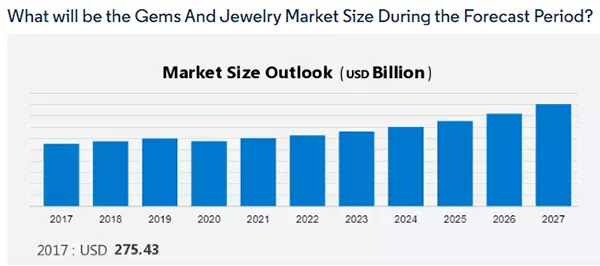
Only a gemstone appraiser can assess the worth of a diamond! Welcome to the world of gems. In 2025, one of the career paths everyone wants to know about is Gemology which is referred to as the scientific study of gemstones.
As a gemologist, you will enter the world where you will be exploring different gems, knowing their properties, or may become a laboratory professional who can aid in new findings.
Not only this, but you can even start your own business of jewelry, become a wholesaler, retailer, designer, appraiser, etc.
If the idea of becoming a gemologist interests you, then you can continue reading this elaborated guide to obtain deeper knowledge concerning gemology, what they do or study, professional careers in this field, and how to kick-start your career in the field of gemology.
A Brief Introduction to Gemology
Gemology in simple terms is the science of studying, cutting, and valuing precious stones. But majorly, the true essence of gemology is in identifying the gemstones. And, a gemologist is someone who studies gemstones.
In order to distinguish one gemstone from another, you’ll need to look for a gemologist. They will then examine both raw and synthesized gemstones under microscopes, computerized tools, and other grading instruments.
The evaluation is based on the gemstone’s characteristics and properties, like cut, color, quality, and clarity.
For instance, by appearance ruby, garnet, and 4 carat round diamond are next to impossible to distinguish while their underlying physical properties differ considerably.
What Do Gemologists Study?
Having said that, gemologists work on evaluating characteristics and properties of gemstones, but besides this, here are the following studies they are responsible for:
- Study gems to comprehend where they came from and what they can be used for.
- The diamond grading system or the study of 4C’s (cut, color, clarity, and carat) of diamond quality.
- The properties of colored stones and the color scale of diamonds.
- Study how to recognize the rarity of a gemstone.
- The mining process.
- Gemstone treatments and enhancements.
- The value of gemstones and the jewelry industry market.
- How to properly use and care equipment.
Professional Careers in Gemology
As a gemologist, you can work in a variety of specific jobs. All you need is training and expertise. A few of the most common career paths in gemology are as follows:
Jewelers and Goldsmiths
Have you ever found a gem and want to know if is it real or not? In such a case, you will most probably visit a jeweler. By understanding gemology, you can pursue a career as a jeweler and identify the gem.
Goldsmiths and metalworkers on the other hand are professionals who distinguish the physical characteristics of the gem to create appropriate settings.

Statistics:
A prediction was made earlier i.e. between 2022 and 2027, the global gems and jewelry market size is estimated to grow USD 137.48 billion.
Lapidaries
Lapidaries are yet another career path to look for in 2025 after the successful completion of gemology learning. As a lapidary, or gem cutter, you will have knowledge of appropriate cutting and polishing techniques that vary from gem to gem.
Bench Jeweler
Bench jewelers are referred to as skilled technicians who have the power to create and repair fine pieces of jewelry using their craftsmanship skills and expert techniques.
To do this job, they utilize tools like soldering irons or polishing wheels, and knowledge of each gemstone’s unique properties.
Manufacturer
Being a jewelry manufacturer, you will be responsible for bringing designs to life and for the creation of product lines for jewelry retail brands. Production is distinct from other careers as a gemologist.
So, manufacturers often staff gemologists in their production team who may help in knowing the origin, value, and quality of the gemstones.
Appraiser
An appraiser conducts gemstone evaluation on the basis of shape, cut, color, measurements, weight, clarity, color, and symmetry. In case, anyone considering reselling or insuring their jewelry will likely visit an appraiser.
Jewelry appraiser gives a sense of its value and provide an official document that can be presented to an insurer or to a retail store.
Do You Know?:
As per the latest report, in the US, 58.2% of gemologists are women and 41.8% of gemologists are men.
Lab and Research Professional
Have you ever heard of lab-grown diamonds? These are created in laboratories after thorough research. After studying gemology, you can pursue a career as a lab and research professional.
You will be responsible for investigating new gems, treatment processes, and detection methods in this field.
How to Get Started in Gemology
It can be tough to break into these gemology-related fields. To ease out, here are the steps you can follow to become a gemologist:
Determine the Area of Gemology You Want to Work In
Are you confused about what to pursue? We understand why. For those who are new to gemology or want to pursue it, as a gemologist you can pursue a multitude of career opportunities.
Then you must opt for the right educational path. To get help, you can research each career in depth or interact with those who are already in this field and have years of experience.
Enroll in Gemology School in Person or Online
Once you’ve determined your career path, you must again look for the best gemology schools or institutions. Remember, the one you will be deciding on must align with your goals and budgets.
Since many institutions have options for in-person or online learning, you can choose accordingly. For instance, if you are a working professional, it is advisable to go with online learning.
Earn Certification
Moving on in the process, it’s time to earn a certificate from the highly certifying body. Keep in mind, that a certification acquired from a highly respected certifying body demonstrates to employers the validity of your qualifications and training.
From the institutions themselves, you can even acquire details about certificates and training opportunities.
Once you have successfully earned a certificate, you are not eligible to move ahead in your career.
Find an Apprenticeship
Most employers in this field want employees to have at least a year of on-the-job training. This is why many gemologists pursue an apprenticeship in their chosen career to help develop hands-on experience.
Find Employment As a Gemologist
After successful completion of apprenticeship, employers likely offer you a full-time position. Prior to completing an apprenticeship, it is good to speak with your manager to discuss any possible opportunities.
Expand your Network
Besides securing full-time employment, it’s ideal to expand your networks for further job opportunities. Or, you can simply use your network to learn about professional development training.
FAQs
Ans: The average salary for a jeweler is $46,702 per year.
Ans: They use a loupe, refractometer, dichroscope, microscope, polariscope, balance beam scale, and heavy liquids.
Ans: It is particularly useful for people with certain careers in Lapidaries (Gem Cutters) and Scientists.